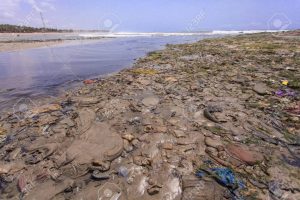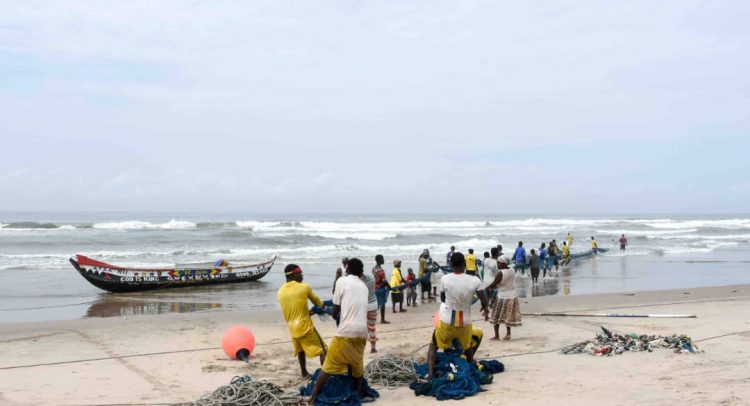Some fishermen of La at work
ONE thing appears common in some four coastal communities DAILY GUIDE visited recently in the Greater Accra Region.
Apart from the sight of the scores of fishermen, dressed in their usual gear, early morning, preparing to start the day at Teshie, Nungua, Labadi and James Town beaches, the level of erosion at the shore is strongly visible, even at a distance of about 100 metres.
Not only are these fishermen and residents directly impacted by the rising sea levels which has translated into scanty catches and dwindling sales on a regular day, they are also inundated with constant storm surges.
Socio-economic impact on livelihood
Historic data in a study “Shoreline change analysis of the coastline of Teshie” conducted by David Augustus Otoo in 2018, revealed that the rate of erosion of the Teshie coastline has affected the socio-economic lives of residents, and this is evident in the low fish catch and loss of landing sites.
Director of the Institute of Environmental and Sanitation studies, Prof. Appeaning-Addo, in a similar study, pointed out the threat of erosion to the Teshie coastline.
61-year old Ataa Mensah, a fisherman at Teshie, told DAILY GUIDE in an interview that the erosion along the shoreline was not new to fisherfolks, however, their concern was the rate at which the shores were fast eroding.
“Though I had some form of formal education, I only ended at primary 6 and joined my father to go fishing, which was really very lucrative back then compared to today, where we have to work so hard and go further onto the sea to get some fish even though we are unable to make enough catch as expected. We are sometimes lucky to get some fish but on most occasions, unlucky, and go home with empty nets”.
Lawrence Okoe, a 49-year old fisherman at Labadi, also recounted his experience.
The situation, according to him, has compelled him and most of his colleagues to resort to various kinds of fishing methods and strategies to be able to get fish for some time now.
George Lawerh, another fisherman at Labadi, stated “We sometimes discuss among ourselves what is taking place here. Though we get some fish when we go to sea, I don’t remember the last time we made a bumper catch in the last 5 years after battling sometimes storms that sometimes destroy our canoes”.
Research reports by experts
Prof. Kwasi Appeaning-Addo, an environmentalist has been researching on coastal erosion impacts for several years.
He reveals that erosion is a major problem that claims up to 2 meters of the country’s coastline each year.
The studies reveal that though erosion may be a natural phenomenon, human factors also contributed to the rising sea levels with its antecedent problems of erosion and flooding.
Even though the fishing communities are characterised by high populations, their major form of livelihood is fishing while statistics indicates that Ghana has lost a lot of the coastal land to erosion and flooding between 2005 and 2017.
Views from other experts
A lecturer with the Department of Marine and Fisheries Sciences at University of Ghana, Legon, Dr. Andrews Agyekumhene, in an interview with the DAILY GUIDE, also said the sea level rise caused by climate change was a major contributory factor that caused erosion in these areas.
According to him, due to global warming, predictions from data are that the sea levels would rise between 1.3 to 1.6 metres by the year 2100 though the sea levels have already risen between 20 metres in the past and expected to rise higher.
Importance of greenhouse gases
He mentioned that the greenhouse gases in the atmosphere are expected to trap some heat from the sun with about 50 percent of the gases to be reflected, and absorbed by the earth while others are emitted back into space.
He stated that the greenhouse gases help trap some of the heat needed for plants to make their food through photosynthesis, prevent the earth from freezing to kill mankind, while producing heat for a lot of people who do not have washing machines to dry their clothes as well as causing evaporation for rainfall.
Dr. Agyekumhene further argued that though the greenhouse gases were not bad, human activities had increased its concentration in the atmosphere.
He said industrialisation, among other factors, have contributed to the concentration of these greenhouse gases especially after the second world war, where most countries wanted to develop and resorted to using a lot of coal for trains and industries.
The environmentalist also said carbon dioxide, which was the main greenhouse gas and the main source of power, was released into the atmosphere and has stayed with man, resulting in increased temperatures causing global warming.
“This has made the sea rise above the normal and moving eventually towards the land and communities nearby, coupled with the melting ice from the polar regions”. He pointed out
He further said that though the climate has never been static and continue to change, there has been an unprecedented increase in temperature after the industrial age compared to past data which showed a rise and fall in temperatures
“Now, with the tapping of crude, emissions of carbon dioxide and methane, among others, the temperatures will keep rising leading to more rising sea levels. The impacts we are seeing today are extreme, affecting every sector compared to the past, and that is why all of us should be worried”.
Dr. Agyekumhene, who has conducted several research studies on ecology and marine mammals, said the warm temperature of the sea threatens the natural habitat of the fish who find it difficult to live under such warm temperature hence have to find a colder area to survive.
Will the situation change for the better?
He maintained that as more carbon dioxide and other greenhouse gases continue to increase, given the actions that contribute to the concentration of greenhouse gases into the atmosphere, temperature will increase.
State intervention so far
The sea defence walls were first constructed at Keta between 2015 and 2019 to defend the coastline from Keta to Hlove in the Volta region of Ghana which was fast experiencing rapid erosion.
Minister for Works and Housing, Asenso Boakye, last year, announced that the government of Ghana has invested GHc2.85 million on coastal protection and sea defence walls since 2017 in areas such as Axim, Amanful Kumah, New Takoradi, Komenda, Cape Coast and Anomabo, while its makes efforts to complete sea defence works at Apam, Axim Phase II, La and Teshie.
The Government of Ghana, in 2017, passed the Coastal Development Authority Act (961) aimed at providing a framework for the accelerated economic and social development of the coastal development zone, accelerating increased access to food, sustainable livelihoods and safety net for low income areas in coastal areas.
Climate Change mitigating measures
Dr. Philip-Neri Jayson Quarshigah, a research fellow with the Institute of Environment and Sanitation Studies (IESS), University of Ghana, Legon asked people to desist from collecting sediments from the beach to prevent erosion and further compound the issue of global warming
He said, although the sea defence is one of the available options using soft or hard engineering, there should be a holistic discussion on what other things the government could do to address the challenges facing some of these communities along the sea.
He also called on government to enforce policies on the ban on home used products from advanced countries such as refrigerators, among others, that emit carbon into the atmosphere and adapt greener environmental practices.
Dr. Agyekumhene also said Ghana could adopt vertical style of building which helps in reducing the number of trees that are destroyed rather than lateral buildings which where a lot of trees have to be destroyed for the construction of buildings.
He also cited wind breeze from the sea as well as wind from mountainous areas as an environmentally friendly way of getting energy as a developing country.
“I feel that we have a duty to the whole world, a duty to our future generation as we plant more trees, take actions that would help reduce greenhouse gases especially carbon dioxide and eventually reduce global warming,” he added.

Some portions of Teshie beach in Accra
This report is produced in fulfillment of the UNESCO and CIJ London Climate Change in News Media project facilitated by the Centre for Journalism Innovation and Development (CJID)
By Ebenezer K. Amponsah


